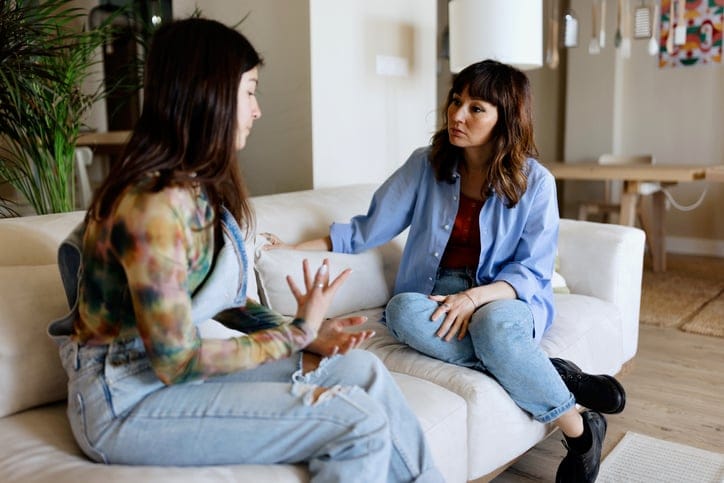We’ve all been there: you’re set for a night out with your friends, wearing your flashiest outfit and cutest makeup. Last minute, your friend texts you and says “Sorry, I can’t make it, I’m not feeling well.” You feel let down and upset. This isn’t the first time they’ve done this. How do you respond to help keep your peace and your friendship? Here are 15 blunt ones.
1. “That may be a reason, but it’s not an excuse.”

Make it very clear to the other person that their behavior still has consequences, regardless of their reasoning. Explanations can be helpful in getting on the same page, but they can’t excuse behavior. Your hurt and disappointment are real—tell them that they still need to make it up to you.
2. “If you don’t want to do [insert activity], just say so.”
 Shutterstock
Shutterstock
Often, excuses are given as a way to get out of something you don’t want to do. Give your friend an out so that they feel safe to share their real reasons with you. If they don’t like to do something, it’s good for you to know to stop inviting them. This will also help build trust between the two of you and keep your relationship strong.
3. “I understand you may be having a tough time, but I have needs too.”
 Shutterstock
Shutterstock
It’s a fine balance between compassion and bluntness. You don’t want to make your friend feel worse. But at the same time, they’ve hurt you by continuing to make excuses. This response could be an opening into a deeper conversation about how you can find a solution that meets you both where you’re at.
4. “Things are going to be different from now on.”

Sometimes you have to set very clear boundaries. Specify how things are going to be different. What are you going to do when they make excuses? Will you disengage, question further, or let yourselves drift apart? Clarity is your friend here. Make sure the other person knows you’re going to take steps to protect yourself if they keep making excuses.
5. “Why do you never want to [insert activity/behavior]?”

This is a very blunt way to get to the real heart of the issue. If your friend is always making excuses for the same activities, there’s almost certainly a deeper reason why they keep flaking. Learning that reason can help you move forward. You might be able to help them work through it, or you’ll know that you have to stop asking them about those specific activities. Either way, it’s better than letting it slide another time.
6. “What is really getting in the way of you showing up?”

If you suspect the other person isn’t being truthful in their excuses (and let’s be honest, they probably aren’t), this is one way of letting them know. It also shows your curiosity to learn why they haven’t been showing up for you. It could open a conversation about struggles they’ve been having and better ways the two of you might be able to support each other.
7. “This has become a pattern. Are you doing ok?”

Not all excuses are made out of malice. Sometimes your friend might be having a really hard time but struggles to open up about that. Let them know that you care and are invested in their well-being. Not only will this help you get to the bottom of their excuses, but it could strengthen your relationship. But always be sure to remind them that their reasoning doesn’t excuse the harm they may have done to you.
8. “I can’t listen to this right now.”
 Shutterstock
Shutterstock
Repetitive excuses can be incredibly frustrating. If you’re feeling very upset by another letdown, you probably need some time to cool off. Let the other person know you’re not in the right space to continue the conversation. Come back to it when you feel calmer, and try one of the other responses on this list to have a deeper conversation with them.
9. “Are you sure you’re telling me the truth right now?”

This is another way of letting the other person know that you’re aware they might be lying. They might get defensive at first, but you’ll find out the truth eventually. It also makes it very clear that you don’t want to be lied to and would rather know the real reason behind their excuses.
10. “If you’re always going to make excuses, I’m going to assume you don’t want to [insert activity].”

Actions tell stories, regardless of the person’s intent. This response sets a very clear boundary with your friend, telling them what steps you’ll take if their behavior continues. You can’t change their behavior, but you can control yours. They can decide whether they’re willing to let you make that assumption. Maybe they’ll tell you the real reason, or they’ll just keep up the excuses and you can feel justified in letting the relationship wither.
11. “Is there something I’m doing that makes you want to make excuses?”

Although it can be hard to admit, sometimes your behavior might not be helping the situation. This opens up the floor for your friend to share concerns they’ve been suppressing. You can use this feedback to improve or, you aren’t doing anything wrong, which will force your friend to realize that their behavior is the issue.
12. “I need somebody who I can rely on.”

Flaky people are, well, unreliable. That kind of unpredictability adds stress to your mental load. Let the other person know that you need people who aren’t going to give you that kind of anxiety. Setting a clear expectation for them might help them support you better. Also, make it clear that you believe in their ability to do better.
13. “What can I do to make it more likely that you show up?”

This is another way to potentially improve your actions. It’ll make your friend feel supported and cared for. Maybe they want more details about your plans beforehand, or they have difficulties with transportation. Whatever the case, there might be things you can do to make them more likely to show up when you make plans.
14. “I feel really hurt by your continued excuses.”

There are few things stronger than raw emotional honesty. Acknowledging your pain and disappointment will help you feel better. It also lets your friend see how much they’re hurting you. If they really care about your friendship, they’ll want to do what they can to reduce that hurt. Let this be an opening into a conversation about both of your emotional needs.
15. “I’m not going to tolerate your excuses anymore.”

If other responses and conversations aren’t working, you might have to cut ties to keep yourself healthy. You could decide to give the other person one more chance or to move on then and there. Whatever you do, know that if you’ve given them chances to change and they don’t take them, it’s better to find people you can count on.
16. Sick of the dating world but still want to find a partner? Turn your love life around with your mind.
Discover the power of thought with our sister site, Sweetn. Their quick quiz and research-backed tools make finding love easy and fun by transforming the way you think about dating and relationships. Click to try now — it only takes a few weeks to see a difference.




